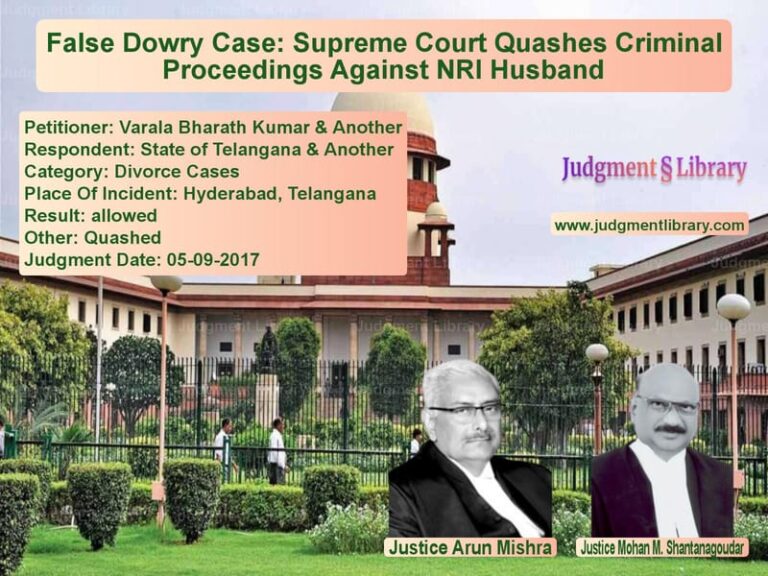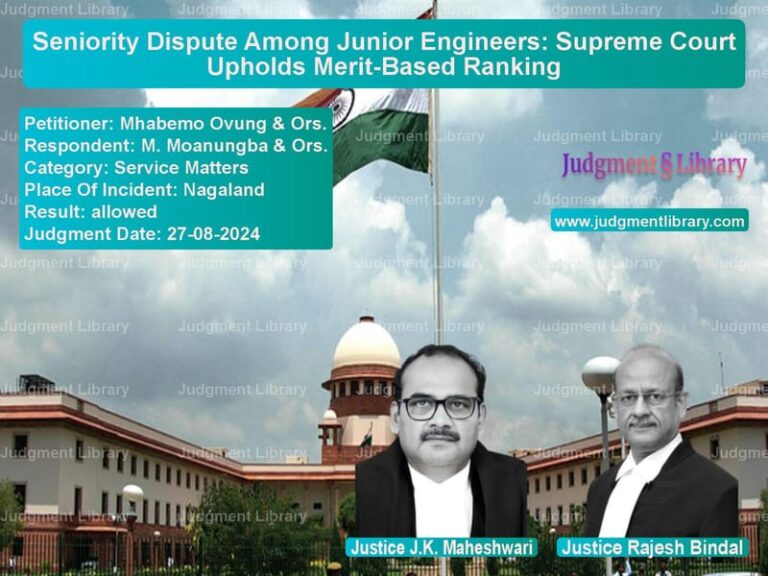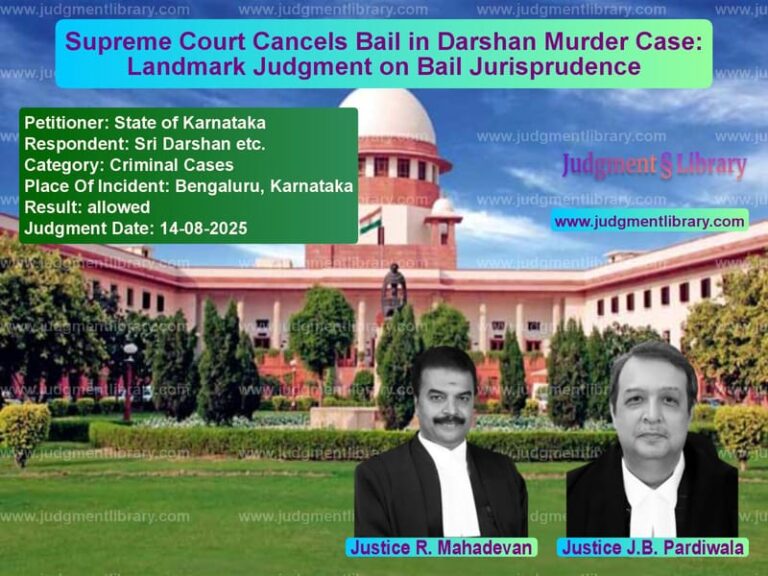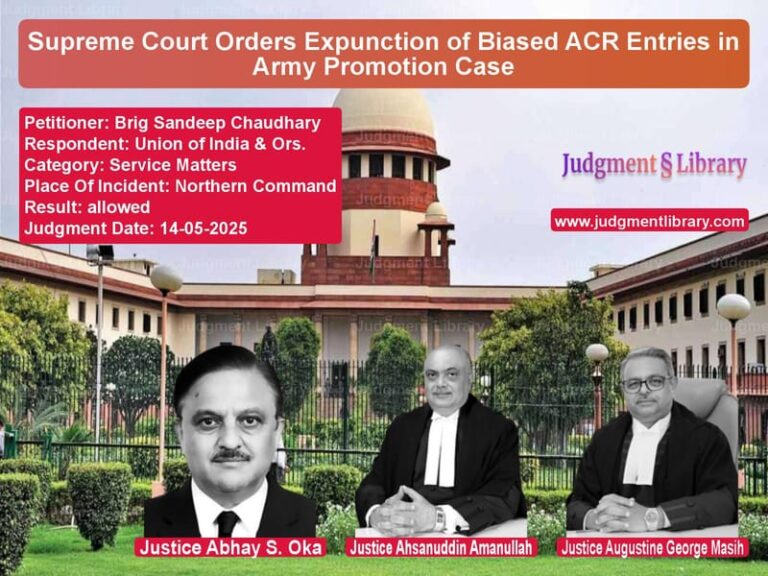Supreme Court Denies Quashing of FIR in Land Fraud Case Involving Extortion and Forgery
The Supreme Court of India, in the case of Parbatbhai Aahir @ Parbatbhai Bhimsinhbhai Karmur & Ors. vs. State of Gujarat & Anr., delivered a significant judgment on October 4, 2017, concerning the quashing of a First Information Report (FIR) under Section 482 of the Code of Criminal Procedure, 1973. The Court ruled that a criminal proceeding involving serious offenses like extortion, forgery, and conspiracy cannot be quashed merely because the complainant and the accused have settled their dispute.
The case arose when the accused allegedly conspired to forge a power of attorney and transferred ownership of valuable land in Jamnagar, Gujarat. The complainant later discovered the fraudulent transaction and registered an FIR. The accused sought quashing of the FIR on the grounds of a private settlement, but the Gujarat High Court rejected their plea, emphasizing the seriousness of the allegations. The Supreme Court upheld this decision, reaffirming that criminal cases involving public interest and financial fraud cannot be settled privately.
Petitioner’s Arguments
The petitioners, Parbatbhai Aahir and others, contended that:
- The dispute was primarily civil in nature and arose from a transaction for the sale of land.
- They had reached a settlement with the complainant, which warranted the quashing of the FIR.
- Under Section 482 CrPC, the Court has inherent powers to quash criminal proceedings if the parties agree to a settlement.
- The allegations of forgery and extortion were baseless and had no merit.
- Allowing the FIR to stand would lead to unnecessary harassment and prolonged litigation.
Respondent’s Arguments
The respondents, State of Gujarat and the original complainant, argued that:
- The accused had engaged in a criminal conspiracy to forge a power of attorney and illegally transfer ownership of land.
- The fraudulent act caused a financial loss of over Rs. 12.50 crores, making it a serious economic offense.
- The accused had criminal antecedents and were involved in multiple land fraud cases.
- The Gujarat High Court had correctly denied relief, citing the public interest in prosecuting financial fraud.
- Criminal cases involving forgery, extortion, and conspiracy cannot be quashed merely on the basis of a settlement.
Key Observations by the Court
The Supreme Court upheld the Gujarat High Court’s decision, emphasizing the importance of prosecuting serious criminal offenses. The bench observed:
“Heinous and serious offenses of mental depravity or offenses like murder, rape, dacoity, etc., cannot be fittingly quashed even though the victim or victim’s family and the offender have settled the dispute.”
The Court further ruled:
- The power to quash an FIR under Section 482 CrPC must be exercised cautiously and only when it serves the ends of justice.
- The accused had a history of fraudulent transactions involving land and had acted as an organized group.
- The allegations in the FIR involved forgery of documents, illegal land transfers, and criminal conspiracy, making the case a serious economic offense.
- Private settlements cannot override public interest in prosecuting serious financial frauds.
Final Judgment
The Supreme Court ruled:
“The High Court was justified in declining to entertain the application for quashing the First Information Report in the exercise of its inherent jurisdiction.”
The Court also clarified:
“Cases involving economic offenses affecting the financial and economic well-being of the state should not be quashed merely because the parties have settled the dispute.”
Implications of the Judgment
This ruling has several significant implications:
- It ensures that serious criminal offenses, especially those involving fraud and forgery, are prosecuted in the public interest.
- It prevents accused individuals from using private settlements as a shield to escape legal consequences.
- It reinforces the importance of judicial discretion in quashing FIRs under Section 482 CrPC.
- It sets a precedent for cases involving financial and economic frauds, ensuring that justice is not compromised.
Conclusion
The Supreme Court’s ruling in this case upholds the principle that economic offenses cannot be treated as mere private disputes. By refusing to quash the FIR, the judgment ensures that financial crimes are prosecuted rigorously, safeguarding public confidence in the legal system.
This case sets a critical precedent, ensuring that serious allegations of forgery, extortion, and conspiracy are dealt with firmly and cannot be dismissed on the basis of out-of-court settlements.
Don’t miss out on the full details! Download the complete judgment in PDF format below and gain valuable insights instantly!
Download Judgment: Parbatbhai Aahir @ P vs State of Gujarat & A Supreme Court of India Judgment Dated 04-10-2017.pdf
Direct Downlaod Judgment: Direct downlaod this Judgment
See all petitions in Fraud and Forgery
See all petitions in Extortion and Blackmail
See all petitions in Bail and Anticipatory Bail
See all petitions in Judgment by Dipak Misra
See all petitions in Judgment by A M Khanwilkar
See all petitions in Judgment by Dhananjaya Y Chandrachud
See all petitions in dismissed
See all petitions in supreme court of India judgments October 2017
See all petitions in 2017 judgments
See all posts in Criminal Cases Category
See all allowed petitions in Criminal Cases Category
See all Dismissed petitions in Criminal Cases Category
See all partially allowed petitions in Criminal Cases Category







